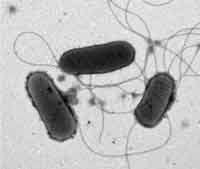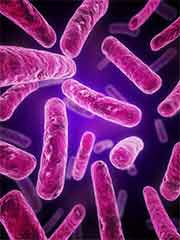Innovations in Pathogenic Organism Research and Development
TNO: Balancing Marketability and Acceptable Risk
By Jaan Koel
TNO in Zeist, part of Holland’s “silicon valley” of food science near Amsterdam, is somewhat of a hybrid when it comes to the food industry. On one hand, TNO is a purely independent food research company pushing the needle in several important futuristic directions that are dedicated to making food safer and more abundant everywhere. As the company develops new technologies, it benefits from selling them. Those technologies that support food supply are particularly important when you consider industry analysts say there won’t be enough food to go around by 2050 because of the lack of distribution infrastructure, and the depressing effects of global warming and other factors on crop and animal yields.
On the other hand, TNO is also a company for hire that conducts specific research for food companies—many of the majors—all over the world. The company’s expertise centers on solving problems, assessing and managing risks related to food toxicology, advising on recall and crisis management activities, consulting on product development, among other things.
TNO employs more than 4000 people in 14 locations in Holland. About 500 work in food R&D. Most are academics, including food toxicology experts, food scientists, project managers, technicians, and marketers.
“On the consulting side, we work to help food manufacturers identify food toxicology and safety risks for their existing products as well as those under development,” says TNO Business Development Manager Food Safety, Marcel van Zandvoort. In simplest terms, this means making food as safe as possible so it doesn’t cause injury or illness. At the same time product development and marketing of the food strives to make it tasty enough so people will buy and eat it. TNO provides know-how, technical research and support, and the highly trained specialists and sophisticated facilities to do this.
In assessing food safety risk, the company starts with “text mining,” which is basically reviewing all available literature published related to a specific project. “When we begin searching the horizon of emerging food safety risks for a client, we start by getting a list of all their ingredients and examine their food toxicology and other safety aspects that exist now as well as what might be expected in the future,” explains van Zandvoort. “We also include the process technology the customer is using to make the final product. We eventually reduce a list of several thousand risk possibilities into 100 or less, and advise the customer on the most important ones, maybe 20 or so, that he or she should be most aware of.”
Van Zandvoort says customers are usually already aware of some or several of them, but invariably TNO comes up with things they may not have thought of, or things no one really cared about before in terms of risk or potential injury to the consumer.
All Aspects
If text mining is not enough to provide a satisfactory analysis or recommendation, then animal or in vitro testing may be required. “We’re experienced in both, and provide either whenever needed,” says van Zandvoort. “We’re experienced in all the tests that are considered international standards. In fact, some of these tests we’ve developed and are continuing to develop ourselves.” An example is world-class work on food allergies.
As food manufacturers develop products, TNO is often asked to help them prepare the product dossiers they need to submit to the appropriate regulatory bodies, such as the European Food Safety Authority, to obtain a safety clearance to go commercial. “We’re very strict, however, on being entirely objective in this process,” notes van Zandvoort. “It’s vital for us to maintain an arm’s length relationship and to protect our reputation as independent professionals.”
A lot of people nowadays want to know that the chicken that laid the egg they’re eating for breakfast was able to run free in the barnyard and was not cooped up in a cage. It brings them a good feeling about eating the egg, or the chicken for that matter. “Based on a three-year research project with the retail and food industry, we were able to measure the subtle chemical and nutritional differences between a free range egg, and one that was produced in a cage. Frequently, TNO is involved in these kinds of analyses,” says van Zandvoort. “Food in all aspects is our business.”
Jaan Koel is a respected food safety writer with a substantial portfolio developed over many years of front line writing experience. He began contributing to GFSR five years ago and is regulator contributor of other industry leading business-to-business publications. Aside from his expertise in the area of article writing, he has developed a strong credibility writing in the areas of corporate communications, public relations, government communications and marketing.
To have more articles like this emailed to your inbox, become a GFSR Member today!

-
 FeaturedRisk management
The Cost of a Breach: What a Cyberattack Could Mean for Food Safety Recalls
FeaturedRisk management
The Cost of a Breach: What a Cyberattack Could Mean for Food Safety Recalls
-
 FeaturedRisk management
Securing the Food Chain: How ISO/IEC 27001 Strengthens Cybersecurity
FeaturedRisk management
Securing the Food Chain: How ISO/IEC 27001 Strengthens Cybersecurity
-
 FeaturedRisk management
Revolutionizing Food Safety Training: Breaking Out of the “Check-the-Box” Mentality
FeaturedRisk management
Revolutionizing Food Safety Training: Breaking Out of the “Check-the-Box” Mentality
-
 GFSI Standards
GFSI 2025: Building Trust, Tech-Forward Solutions, and Global Unity in Food Safety
GFSI Standards
GFSI 2025: Building Trust, Tech-Forward Solutions, and Global Unity in Food Safety
-
 FeaturedFood Safety
Integrated Pest Management: Strategies to Protect Your Brand’s Reputation
FeaturedFood Safety
Integrated Pest Management: Strategies to Protect Your Brand’s Reputation
-
 FeaturedFood Safety Culture & Training
No Open Door Policy: Challenges That Impact Pest Control in Food Processing Plants
FeaturedFood Safety Culture & Training
No Open Door Policy: Challenges That Impact Pest Control in Food Processing Plants




